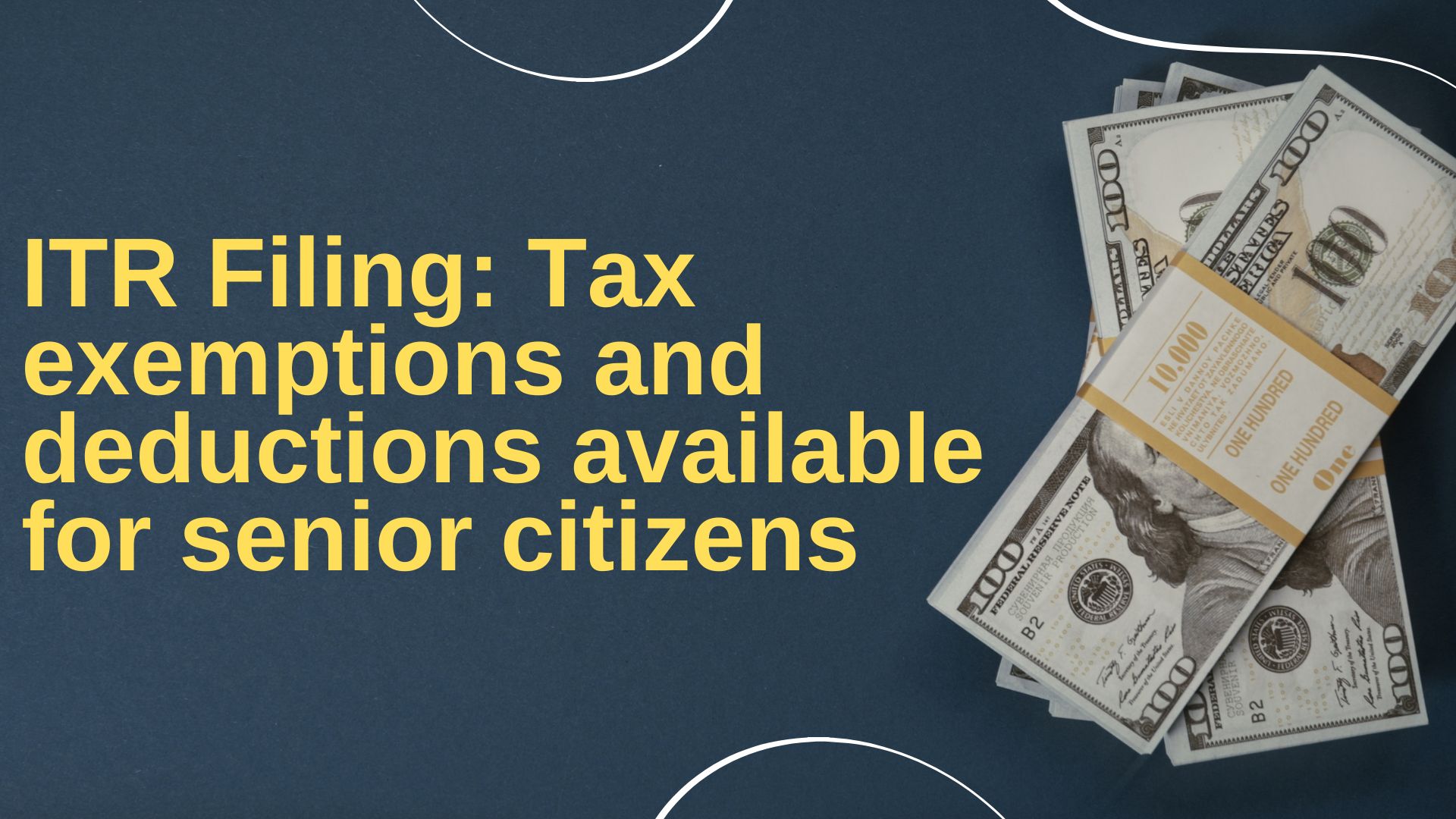ITR Filing: Tax exemptions and deductions available for senior citizens
The income tax filing season for the fiscal year and assessment year has commenced. Seniors are entitled to substantial tax benefits under the income tax laws. To qualify, an individual must be at least 60 years old but not exceed 80 years of age at any point during the year.
Even if seniors or super seniors have income exceeding the exemption limit, they are still obligated to pay taxes. However, this exemption applies only to filing the income tax return (ITR) and does not waive the actual tax liability.
Pension income, along with income from other sources, is mainly liable for taxes. However, it’s important to note that government commuted pension income, which is paid as a lump sum right away, is fully exempt from taxes. On the other hand, uncommuted pension income is taxed according to the applicable marginal tax slab rates under the “Salaries” category.
The taxation of commuted pension income from private companies falls under the “Salaries” category, subject to the applicable tax rates.
Increased exemption limits Tax-saving investments will be included in the income tax returns for the financial year. The new tax law removes benefits such as Section 80C for interest income and health insurance premiums, but several advantages from the old regime remain.
Senior citizens aiming to settle their tax liabilities should prioritize their income sources. Consider all your income streams, including salary, pension, fixed deposit earnings, interest from savings accounts, rental income, capital gains from investments, and more.
If an individual’s total income is below a certain threshold (₹5 lakhs in the previous tax regime and ₹7 lakhs in the current tax regime), they qualify for a tax rebate under Section 87A of the Income Tax Act. The rebate amount would be ₹12,500 (or ₹25,000 in the new tax regime), reduced by the actual tax payable.
Senior citizens are entitled to higher deduction limits and exemption benefits compared to younger taxpayers. The key difference is in the basic exemption limit, which is the maximum amount exempt from taxes. For senior citizens aged 60-80 years, the exemption limit is ₹3 lakh, while for younger taxpayers, it is ₹2.5 lakh.
The higher exemption limit directly reduces their taxable income. Taxable income is calculated by subtracting the exemption cap and any applicable deductions from the total income. A higher exemption limit means that a larger portion of their income is exempt from taxes.
Additional deductions available for senior citizens
Senior citizens are eligible for a range of extra deductions, as detailed below:
Section 80D: Seniors with higher medical expenses can benefit from premium deductions on health insurance. Compared to younger taxpayers, they qualify for larger deduction limits under this section.
Section 80TTB: This section allows for the deduction of interest income from deposits up to a specified limit. Since many seniors rely on interest income from savings accounts and fixed deposits, this deduction is particularly useful for them.
Section 80C: Senior citizens can claim deductions for investments made in various tax-saving schemes. One such option is the Senior Citizens Savings Scheme (SCSS), which offers competitive interest rates and qualifies for Section 80C deductions.
To calculate a senior citizen’s taxable income, their total income is first determined, followed by any applicable exemptions and deductions. Here’s a breakdown of the process:
Step 1: Calculate total income, which includes:
- Pension income
- Interest earned from investments such as savings accounts and fixed deposits
- Income from other sources (business income, capital gains, etc.) as well as rental income
Step 2: Apply the available deductions. Senior citizens can benefit from various deductions under the Income Tax Act, including:
- Section 80D: Health insurance premium deductions (usually with higher limits for seniors)
- Section 80TTB: Interest income deductions from deposits, up to a specific maximum
- Section 80C: Investment deductions for tax-saving options, like the SCSS
Step 3: Senior citizens enjoy a higher basic exemption limit than younger taxpayers:
- For those aged 60 to 80 years, the exemption limit is ₹3 lakhs.
- For those aged 80 years or older, the exemption limit is ₹5 lakhs.
Step 4: Calculate taxable income:
- Subtract the relevant deductions from total income (Step 1).
- Apply the exemption limit (₹3 lakh or ₹5 lakh) depending on the senior citizen’s age.
- If the remaining amount after deductions exceeds the exemption limit, the result is the taxable income.
In essence, seniors benefit from higher exemption limits and additional deductions, which reduce their taxable income. This allows them to retain more of their retirement income while paying less in taxes overall.
Additionally, the health and education cess and surcharge will be considered. To calculate the final tax liability, the applicable surcharge (if any) and the 4% health and education cess will be deducted. Any interest charges, penalties, or late filing fees may increase the overall tax liability. Contact us for more details.
Need Help?
FAQs
1. Who is considered a senior citizen under the Income Tax Act?
A senior citizen is an individual aged 60 years or above but below 80 years during the financial year. Individuals aged 80 years or above are categorized as super senior citizens.
2. What is the basic exemption limit for senior citizens?
- For senior citizens (aged 60-80 years): ₹3,00,000.
- For super senior citizens (aged 80 years and above): ₹5,00,000.
3. Are senior citizens required to pay advance tax?
Senior citizens who do not have income from business or profession are exempt from paying advance tax. They can pay their taxes as self-assessment tax.
4. What deductions are available under Section 80C for senior citizens?
Senior citizens can claim deductions of up to ₹1,50,000 under Section 80C for investments and expenses such as:
- Fixed deposits (minimum 5-year tenure).
- Public Provident Fund (PPF).
- National Savings Certificates (NSC).
- Senior Citizens Savings Scheme (SCSS).
- Life Insurance Premiums.
5. Are there any additional benefits under Section 80D for health insurance premiums?
Yes, senior citizens can claim:
- Up to ₹50,000 for health insurance premiums.
- Up to ₹50,000 for medical expenses if no health insurance policy is available.
6. Can senior citizens claim deductions on interest income?
- Section 80TTB: Senior citizens can claim a deduction of up to ₹50,000 on interest earned from savings accounts, fixed deposits, or recurring deposits.
7. Are there any tax benefits for medical treatment expenses?
Yes, under Section 80DDB, senior citizens can claim a deduction of up to ₹1,00,000 for medical treatment of specified diseases such as cancer, chronic kidney disease, etc.
8. What are the tax benefits for reverse mortgage loans?
Amounts received under a reverse mortgage loan are not considered income and are therefore exempt from taxation.
9. Can senior citizens claim deductions for donations under Section 80G?
Yes, donations made to eligible charities and funds are eligible for deductions under Section 80G, subject to specified limits.
10. Is there any rebate available under Section 87A for senior citizens?
Senior citizens with taxable income up to ₹5,00,000 can avail of a rebate of up to ₹12,500 under Section 87A, effectively making their tax liability zero.
11. Are there any exemptions for super senior citizens?
Apart from the higher basic exemption limit of ₹5,00,000, super senior citizens can benefit from all the deductions available to senior citizens under various sections.
12. What documents are required for claiming tax exemptions and deductions?
- Age proof (Aadhaar, PAN, or birth certificate).
- Interest certificates from banks or financial institutions.
- Premium payment receipts for health insurance.
- Medical bills and treatment certificates for specified diseases.
- Investment proof for deductions under Section 80C.
- Donation receipts for Section 80G.
13. How can senior citizens file their ITR online?
Steps for filing ITR:
- Log in to the Income Tax e-filing portal.
- Choose the applicable ITR form (usually ITR-1 or ITR-2).
- Enter income details, exemptions, and deductions.
- Verify and submit the return.
- E-verify using Aadhaar OTP, net banking, or other available methods.
14. Should senior citizens consult a tax expert?
While the filing process is user-friendly, consulting a tax professional ensures:
- Accurate reporting of income and deductions.
- Maximized tax savings.
- Compliance with the latest tax laws.
Table of Contents
Toggle



